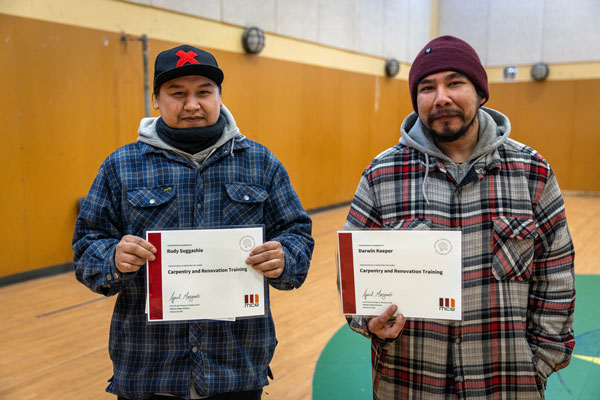More than 200 members of 14 Indigenous communities, including a sizable number of young people, in Ontario, Saskatchewan and British Columbia, have gained basic valuable construction skills that will allow them to pursue further trades training or perform small maintenance/renovations on their own homes and, in the process, revitalize those communities.
They were participants in Resilient Housing and Upskilling for Canada Communities, a program funded by the federal government and delivered by five colleges.
Those colleges were the British Columbia Institute of Technology (BCIT) in Burnaby, Hamilton, Ont.-based Mohawk College, Kelowna, B.C.-based Okanagan College, the Saskatchewan Indian Institute for Technologies in Saskatoon and Regina-based Saskatchewan Polytechnic.
The program was a component of the Canadian Colleges for a Resilient Recovery, a broad-based coalition of 15 colleges, cégeps and polytechnics from across Canada which supports skill development and innovation for a low carbon economy.
Funding for Resilient Housing ended this past March, but the participating colleges say the training can be a springboard for the participants to access further construction.
Consider what was achieved in the far northwestern Ontario community of Pikangikum where 18 trainees were taught basic carpentry and renovation skills for building and repairing houses. Two five-week sessions were provided, one in the fall of 2023, and the second this past winter.
The training was provided through collaboration between Mohawk College’s IDEAWORKS Energy and Power Innovation Centre (EPIC) and the Independent First Nations Alliance (IFNA).
IFNA is a First Nation-led tribal council representing and supporting northern Ontario rural and remote communities and has been working with EPIC for five years on energy and community asset-related projects.
“Pikangikum is the largest remote community served by IFNA and there was interest from Pikangikum First Nation and Pikangikum Education Authority to participate and support the program,” says Mohawk College senior communications spokesperson Bill Steinburg.
EPIC general manager Mariano Arriaga and project manager Erica Daly and a small number of Mohawk College research and support staff were involved over the two sessions. Daly also enlisted the help of television home improvement host Jon Eakes, who conducted some of the training.
Long before any instruction could be provided, however, considerable planning, preparation and operations were required including developing the curriculum.
IFNA staff played a critical role in flying in material and equipment, and the Pikangikum First Nation and the education authority helped the college obtain a training location as well as promoting the course and securing participants. The Pikangikum School also provided IT equipment and a projector.

Most of the training was hands-on, with a focus on instructing the trainees on how to work with house construction hand and power tools. Some of the tools included a drill and driver, plus jigsaw, oscillating and circular saws.
Over the course of the sessions there were some opportunities for the groups to conduct external house repairs on some of the participants’ homes, he says.
Asked if Mohawk College is doing an evaluation of the program’s success, Steinburg says a report has not been published. The participants, however, did demonstrate new competencies and were recognized with credentials. For some, it was the first time they received a certificate of some sort.
Another example of the program’s success is the Green Building Awareness training 127 Indigenous youth (ranging from 15 to 19) in Saskatchewan acquired.
It was delivered through a partnership between Saskatchewan Polytechnic’s School of Continuing Education and Indigenous Strategy.
Five Indigenous communities participated. They included the Mistawasis First Nation, One Arrow First Nation, Sturgeon Lake First Nation, Montreal Lake First Nation, and Ahtahkakoop First Nation.
“The training focused on green energy and sustainable building technologies and highlighted career paths that contribute to building sustainable and healthy communities,” says Saskatchewan Polytechnic’s director of training solutions, Gerry Youzwa.
After first earning an online Safety Construction Orientation Training (SCOT) certificate and a certificate of participation in the Improving Your Home’s Energy Efficiency micro-credential, the participants had the opportunity to transition to a second stage hands-on training at the polytechnic’s Prince Albert campus.
Consisting of carpentry, electrical and/or plumbing basics, the training was designed “to build knowledge in green building technologies as well as exposing them to career paths and programs that can be pursued to build sustainable and healthy homes.
“The importance of sustainable housing in these Indigenous communities cannot be overstated as it directly impacts the health, culture and economic well-being of Indigenous peoples.”
The project provided students an opportunity to learn about trades’ education and post-secondary pathways they might want to pursue after high school, says Youzwa.
Saskatchewan Polytechnic will be watching for further training funding opportunities to apply for, he says.
training. There is also the possibility that funding for a second phase might be reactivated